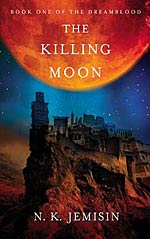
![]() JDowds
JDowds
3/5/2013
![]()
I just bought a Queen size bed. It's glorious. Granted, I can't move around in my bedroom anymore, but it's totally worth it.
There's a little rack next to it. My girlfriend asked me to hang it in the bathroom months ago, but I never did. And I won't, because it's a great place to put my beer when I'm sitting in bed.
So I spent my weekend in bed, beers on standy, with The Killing Moon in hand. It was a near perfect weekend. I devoured Jemisin's book in four days. I would've gotten through it sooner, but eventually the drinking muddied my brain and I had to go play video games instead.
Nonetheless, The Killing Moon is a great book, and for the first time in a while, I found myself unable to put it down (when I was sober).
The story centers of three people: the Gatherers Ehiru and Nijiri, and a foreign emissary named Sunandi. Actually, there's a fourth character, that of the main city, Gujaareh. Though there are no maps of the city, Jemisin weaves the place together with such strong visuals that it's hard not to imagine it. Few authors nowadays seem capable of bringing a city to life like she has done here.
Within the walls, the Gatherers put people to sleep. Old people, sick, the corrupt, the Gatherers make them fall asleep, take their essence, and send their souls to a merry afterlife. At least, that's the idea. The magic is at the forefront of this novel, and like many magical systems, IT IS NOT ALL IT SEEMS! Que dramatic conspiracy music.
Joking aside, the magic is pretty cool and unique. There are some hints of a SF element to them, but that may be me reading too much into it. Rather than digging through an info dump, I found myself enjoying the explanation and exploration of Jemisin's magic system and its implications.
While the world-building is fantastic, the characters are where this book really shines. Ehiru and Nijiri are master and apprentice, but things start out complicated. Ehiru has recently botched a Gathering, condemning a soul to a horrid afterlife by accident. Nijiri, who was all but raised by the priesthood after being taken in by Ehiru years before, only wants Ehiru as his master, despite other Gatherers being available.
On the surface, this book may appear to be an Apprentice surpasses the Master type deal, but it's so much more than that. It's a coming of age story, and a critique of blind faith. Ehiru believes in his religion, believes in his purpose. In a sense, he's pretty one dimenstional.
Yet, through Nijiri, we see how complex Ehiru really is. We see the devotion to each other, and the love between them. We see that Nijiri's faith isn't in the religion, but the man who saved him as a child. By the end of the book, his faith is tempted, but his bond to Ehiru never wavers.
It's a well done, complex relationship, and it felt like a breath of fresh air in a genre that feels (at times) constrained to the typical Boy Hero/Girl Hero trope.
And what kind of fantasy book would it be without POLITICAL SCHEMES OF A DASTARDLY NATURE!? Never fear, The Killing Moon has them aplenty. While it may not be the most original of political plots, the backdrop of Gujaareh, the magic system, and the characters made it feel unique and interesting.
A quick aside, though she appears as little more than a plot device initially, Sunandi becomes a character in her own right, and a pretty cool one at that. Though, in the end, Ehiru and Nijiri outshine her in almost every respect.
I'm definitely going to read A Shadowed Sun, the sequel, and I've got no problem saying that after reading The Killing Moon, NK Jemisin is one of the best new, and important fantasy writers to come along in a while. I can't wait to see what she does next.